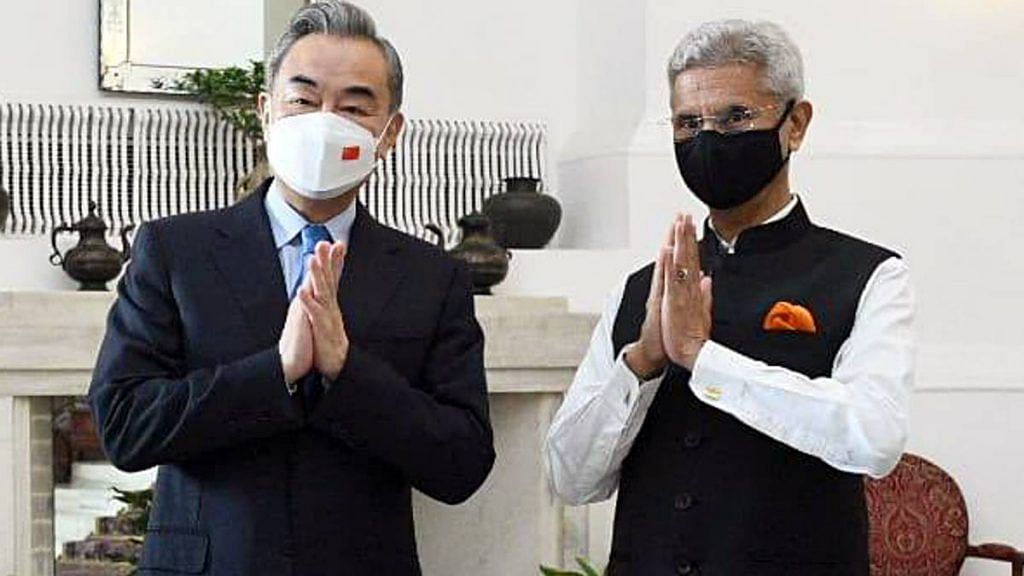New Delhi: India and China have reached an understanding on disengagement and de-escalation at their Himalayan border in Ladakh, but no timeline has been set for resolving the conflict, which began two years ago and has seen 15 rounds of talks between senior commanders.
External Affairs Minister S. Jaishankar also said Friday that China had invited Prime Minister Narendra Modi to visit the country for the upcoming BRICS (Brazil-Russia-India-China-South Africa) Summit. He added that China had expressed a desire that bilateral ties “come back to normalcy”, while talks on the border standoff continue in parallel.
Jaishankar was briefing the media after talks with his Chinese counterpart, Wang Yi, who was in the national capital for less than 24 hours after arriving late Thursday evening.
“We have still ongoing friction areas … We also made a lot of progress and Pangong Tso is notable in that regard. How to take this forward was essentially what was discussed. So long as there are very large deployments in the border areas, which are violative of the 1993 and 1996 agreements, clearly the border situation is not normal… Our relationship is not normal today and it cannot be if the situation in border areas is abnormal,” Jaishankar said.
“The meeting led to an understanding on disengagement and de-escalation (at the Line of Actual Control),” he added , adding that there was “no timeline” set for resolving the border issue.
Wang held the bilateral meeting with Jaishankar for nearly three hours prior to meeting with National Security Advisor (NSA) Ajit Doval, who is also India’s Special Representative (SR) on the India-China boundary question. Wang himself is China’s SR.
This was Wang’s first visit to India since the standoff began, although he has been in regular touch with Jaishankar. His last visit was in 2019.
Jaishankar added, “I would describe the current situation as work in progress, obviously at a slower pace than desirable, and my discussion with FM Wang Yi today was aimed at expediting that process.”
“The impact of the tensions in the border areas on the overall relationship has been visible in the last two years, since peace and tranquility in the border areas have been the foundation of stable and cooperative ties,” he said.
He also said, “If we are both committed to improving our ties, then this commitment must find full expression in ongoing disengagement talks.”
The ministers also discussed the issue of Indian students not being allowed to return to their universities in China due to Covid restrictions, as well as matters of trade and commerce.
“Our talks today added to clarity regarding various aspects of our bilateral relations,” said Jaishankar.
During his meeting with NSA Doval, Wang said, “China and India should stick to their own development paths and join hands to safeguard peace and stability both in the region and in the world,” according to a statement issued by the Chinese government.
The statement also said that, to achieve this objective, Wang had proposed a three-point approach to Doval — First, both sides should view bilateral relations with a long-term vision; second, they should see each other’s development with a win-win mentality; and third, India and China should take part in the multilateral process with a cooperative posture.
‘I was honest with Wang Yi’
While praising the disengagement that took place in the Pangong Tso area in February last year, Jaishankar said he had been “honest” with Wang that the standoff issue had to be resolved in its “entirety”.
“I was very honest in my discussions with the Chinese foreign minister, especially in conveying our national sentiments on this issue. The frictions and tensions that arise from China’s deployments since April 2020 cannot be reconciled with a normal relationship between two neighbours,” Jaishankar said.
“Presence of a large number of troops is abnormal,” he said, adding that there had been no discussion with Wang on the Indo-Pacific or the Quad.
“Our effort is to sort out the issue in its entirety and deal with the disengagement, so that it then allows us to look at the de-escalation possibilities,” he said.
On the issue of the Russia-Ukraine war, Jaishankar said the Indian and Chinese sides had both given their own perspectives.
“But where we had a common element was that both of us agreed on the importance of an immediate ceasefire and a return to diplomacy and dialogue.”
Afghanistan also featured in the discussions. Wang had been on a short trip to Kabul before landing in Delhi. From India, he left for Nepal.
“Insofar as Afghanistan is concerned, India’s policy is guided by the UN Security Council Resolution 2593,” Jaishankar said.
On the issue of students going to China to resume their studies, he said, “We hope that China will take a non-discriminatory approach since it involves the future of so many young people. Minister Wang Yi assured me that he would speak to the relevant authorities on his return on this matter. He also recognised the particular concerns that medical students have in this difficult situation.”
(Edited by Rohan Manoj)
Also read: Doval tells Wang LAC disengagement a must, could visit China after ‘immediate issues’ resolved
